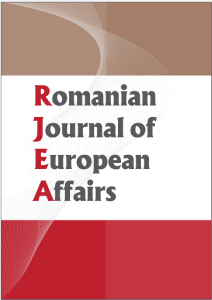Ediția de vară a Romanian Journal of European Affairs aduce în atenția cititorilor subiecte precum: iliberalismul, noua ordine mondială, amenințările pentru sistemul financiar global, convergența economică, costurile Brexit, noi forme de condiționalitate pentru Balcanii de Vest, provocările Acordului de parteneriat UE-Armenia.
Can Democracies Tackle Illiberal and “Inward-Looking” Drives?
Daniel Dăianu
Abstract
There is evidence of mounting illiberal inclinations in the industrialized world, in democratic societies; an “inward-looking” syndrome (rising nationalism) is also taking place. Are they to be linked with temporary drivers in the ‘extraordinary times’ we are living through, or do they have deeper roots? An answer to this question begs an examination of trends in society and economy, of the emergence of new (unconventional) threats, of disruptions and, not least, of failed public policies. The argument that ‘liberal democracy’ is on the wane is misleading to the extent that policies can be corrected, that citizens and elites alike do not lose trust in democratic values. It may also be true that, although democracy has a ‘liberal core’, it can also be driven by ‘illiberal’ components, and that the magnitude of the latter can vary. But for democracy to survive, its liberal core must be preserved.
Keywords: liberal democracy, illiberalism, “inward-looking syndrome”, nationalism, de-globalisation, multilateralism, protectionism, integration, fragmentation, inclusion, inequality, fairness, Eurozone, risk-sharing
“Make the World Order Great Again” – The Fight over the Liberal Order as an Instance of the Transatlantic Divide
Alina Bârgăoanu
Abstract
The purposes of this article are a) to offer some highlights on the various concepts conflated under the term “world order” (post WWII world order, liberal order, global order), thus underlining its context-specific character; b) to place the discussion in the current context of the Transatlantic Divide and c) to examine EU’s embrace of the current narrative of a universalistic, unhistorical liberal order and the consequences of such embrace for the amplification of the Transatlantic Divide and of the internal East-West one. The choice to focus on the challenges to the world order from within the Transatlantic world and from its most prominent members is motivated by the fact that, to our understanding, this development is age-defining. The fact that China would challenge the world order that was established by its main competitor – US – in order to serve its own interests is less spectacular than the fact that the dismantling of the US-led world order appears to be led by US itself or the fact the biggest fights over the current order and its aftermath take place within the Transatlantic world itself.
Keywords: world order, liberal hegemony, Transatlantic divide, East-West divide
Threat to Multilateralism of Global Financial System
Eugen Dijmărescu
Abstract
This research has been encouraged by two major developments of December 2017: the US National Security Strategy announced the end of the “global community” and coldly replaced it with the paradigm of great power competition; the European Commission transmitted to the European Council the Proposal for establishing a European Monetary Fund. Both documents raise the awareness of the crisis of the world order and the need for action. The paper combines the literature research with the field experience of the author in various international forums. The fragile equilibrium of present state of affairs in world finance is threatened by a combination of political mistrust in multilateralism with enhanced nationalism and hegemonic attitudes. Confronted with those, Europe needs a determined action to foster both unity and its political power, and findings of this paper are meant to provide arguments for action.
Keywords: international finance, world order, multilateralism
Economic Convergence between the Western Balkans and the New EU Member States (EU-13)
Dzenita Siljak, Sándor Gyula Nagy
Abstract
The aim of the paper is to investigate if the Western Balkan countries converge towards the new Member States of the European Union, the EU-13. The analysis is focused on beta convergence, defined as a tendency of poor countries to grow faster than rich countries. The analysed period is 2004-2017, with two sub-periods; 2004-2008 and 2009-2013. The subdivision is made in order to test the research hypotheses that the recent financial crisis negatively affected the absolute and conditional convergence process of the Western Balkans towards the EU-13. The relationships between per capita GDP growth rate and selected macroeconomic variables are econometrically tested and the empirical results support the convergence hypothesis. The convergence rates range 1.3%-3.6%. The negative effects of the crisis on convergence are not confirmed, i.e., the convergence rates during the crisis period are the highest among the analysed periods. The poorer countries should open their economies and maintain stable inflation and debt, as economic openness and inflation have a positive impact on per capita growth in the analysed countries, while general government debt has a negative impact.
Keywords: Beta convergence, Western Balkans, European Union, New Member States, Transition, Financial crisis
The Cost of Brexit: Neo-Functionalism Strikes Back
Hakan Cavlak
Abstract
On 23 June 2016, British people decided to leave the European Union by 51.9% at Brexit referendum. With the launch of the 50th article of Lisbon Treaty by Theresa May on 29 March 2017, the negotiations which are called as “Brexit talks” began. It is assumed in this paper that either concluded successfully or not, the economic, social, political, cultural costs of Brexit, would diminish the probability of leaving the EU option for other sceptic members while dealing their problems with the EU. Any potential future sceptic EU member, who witnessed the difficulty and complexity of UK leaving the EU (known as a powerful country and the leading Eurosceptic in the Union), would hardly consider leaving the EU. The theory of neo-functionalism will be both used as the argument and the explanatory tool for proving the assumption made above.
Keywords: Neo-functionalism, European Union, Spill-Over Effect, Euroscepticism, Disintegration
The EU’s Paternalistic Approach to the Integration of the Western Balkans – Border Disputes as a New Conditionality: Case of Prevlaka
Srdjan Orlandic
Abstract
In February 2018, the European Union (EU) announced the Strategy for the Western Balkans’ European integration that introduced a new momentum in the conditionality policy, which has the potential to decisively impact the pace and success of enlargement process. That addition to the conditionality policy concerns requirement to settle any open border issues prior to accession to the EU. Thus, this paper is assessing how border disputes could impact the integration processes of countries of the region in the light of the new conditionality. In addition, it will discuss one particular open border dispute in the Western Balkans involving the most advanced candidate country in the accession process (Montenegro) and the youngest member country (Croatia) over the Prevlaka peninsula.
Keywords: European Union, Western Balkans, Conditionality Policy, Border Disputes, Montenegro, Croatia, Prevlaka
Bringing Armenia Closer to Europe? Challenges to the EU-Armenia Comprehensive and Enhanced Partnership Agreement Implementation
Aram Terzyan
Abstract
The Comprehensive and Enhanced Partnership Agreement (CEPA), inaugurated in March 2017, has breathed new life into waxed and waned EU-Armenia partnership. There is a lot of scholarship on the domestic state of affairs in Armenia and consideration of the combined effects of power transition, tough economic contexts, geopolitical fragility and other ways in which the specific ‘Armenian reality’ affects the way that EU policies are received and implemented (Kostanyan and Giragosian, 2016; Delcour, 2015; Delcour and Wolczuk, 2015; Delcour, 2018). This paper aims to build upon existing scholarship and addresses the following research question: What are the implications of the ‘velvet revolution’ for Armenia’s relations with the EU within the CEPA? The paper contends that despite the power transition, political and economic conditions underlying Armenia’s arbitrary decision to join the Eurasian Economic Union (EAEU) and constraining country’s profound advancement towards the EU have largely remained unchanged. Therefore, the EU’s ‘competing governance provider’ Russia maintains its economic and political grip on Armenia, with its ensuing adverse effects on the EU-Armenia rapprochement, and more specifically on the effective implementation of the CEPA.
Keywords: CEPA, Armenia, ‘Velvet Revolution’, EU external governance, ENP review, Eurasian Economic Union






